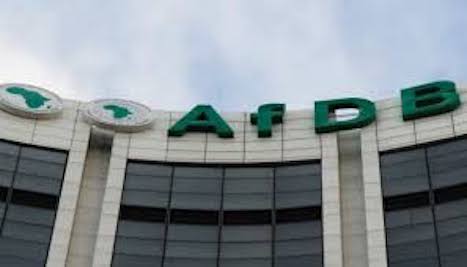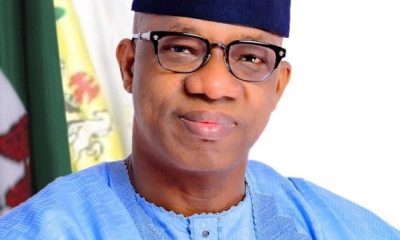BUSINESS
AfDB Approves $1.5bn to Fight Hunger in Africa

The AfDB Group’s Board has approved a $1.5 billion facility to support African countries deal with the impact of the Russian-Ukraine war impacting food prices and availability
AfDB’s Chief Agriculture Policy Economist and Coordinator of Global Agriculture and Food Security Programme at AfDB, Mr.
Philip Boahen, said this at Tamale, Ghana at the weekend.Boahen said the facility is expected to reach over 20 million African farmers to deal with the food shortfall.
The bank, on its website, also said that with the disruption of food supplies arising from the war, Africa now faces a shortage of at least 30 million metric tonnes of food.
AfDB said that food like wheat, maize, and soybeans imported from both countries was majorly affected by the war.
According to the Bank, the $1.5 billion, an African Emergency Food Production Facility, is an unprecedented comprehensive initiative to support smallholder farmers in filling the food shortfall.
The AfDB said it would provide fertilizer to smallholder farmers across Africa over the next four farming seasons, indicating it will use its convening influence with major fertilizer manufacturers, loan guarantees, and other financial instruments to provide the fertilizers.
“African farmers urgently need high-quality seeds and inputs before the planting season begins in May to immediately boost food supplies.
“The facility will provide 20 million African smallholder farmers with certified seeds.
“It will increase access to agricultural fertilizers and enable them to rapidly-produce 38 million tonnes of food.
“This would be a $12 billion increase in food production in just two years,” the AfDB said.
The Bank said the facility would lead to the production of 11 million tonnes of wheat; 18 million tonnes of maize; 6 million tonnes of rice; and 2.5 million tonnes of soybeans.
“It will also support market growth and post-harvest management, and create a platform to advocate for critical policy reforms to solve the structural issues that impede farmers from receiving modern inputs.”
In a related development, the African Petroleum Producers’ Organisation (APPO) and African Export-Import Bank (Afreximbank) have signed a Memorandum of Understanding (MoU) to establish an African Energy Transition Bank.
This is contained in a statement signed by Afreximbank’s Media Contact, Mr. Amadou Sall, at the weekend.
Sall said the establishment of the energy bank was in support of an African-led energy transition strategy.
He said the new institution would accelerate Africa’s economic development while ensuring the progress was compatible with and complementary to, the Sustainable Development Goals,
Sall said that the new bank would also ensure compatibility with the continent’s long-term social and environmental objectives as set out in African Union’s Agenda 2063: The Africa We Want.
He said that the bank would address an urgent and existential need on the continent.
“Africa stands to experience profound effects from climate change, while the considerable poverty across the continent further disincentivises a focus on environmental care and sustainability for many populations.
“Moreover, Africa’s oil and gas industry faces growing pressures as international investment in hydrocarbons diminishes.
“While Africa’s transition towards alternative energy sources presents great opportunities for the continent, this transition must be carefully managed to minimise the short-term adverse impacts of the transition while maximising its longer-term benefits,” he said.
Sall said the new bank’s responsibilities would include the management and encouragement of such a productive transition.
He said that APPO member states would be signatories to the Energy Transition Bank’s constitutional documents which would be structured in the form of a multilateral treaty, and invest equity into the new vehicle.
Sall said that Afreximbank would co-invest and advise on the establishment and implementation process.
The statement quoted Prof. Benedict Oramah, President of Afreximbank, as saying “we are delighted to be collaborating with APPO towards the establishment of the proposed African Energy Transition Bank”.
“These are challenging times when we must strive to strike the right balance between the imperatives of mitigating climate change and the urgency of averting social upheavals as a result of increasingly difficult economic and financial conditions in Africa.
“For us at Afreximbank, supporting the emergence of the African Energy Transition Bank will enable a more efficient and predictable capital allocation between fossil fuels and renewables.”
Oramah is quoted to have said that establishing the bank would also free human and other resources at Afreximbank that would make it possible to support its member countries more effectively in the transition to cleaner fuels.
Oil & Gas
PETROAN says Dangote Fuel Plan Threatens Downstream

Petroleum Products Retail Outlets Owners Association of Nigeria (PETROAN) on Monday raised alarm over the plan by Dangote Refinery to start direct nationwide distribution of petrol and diesel.
In a statement issued on Monday, PETROAN spokesperson, Mr Joseph Obele, said the move by Dangote could have consequences on the country’s downstream sector,
According to him, such consequences include widespread job losses and the shutdown of small businesses.
On June 15, Dangote Refinery disclosed its plan to distribute petrol and diesel directly to consumers across Nigeria.
Reacting to this development, PETROAN National President, Dr Billy Gillis-Harry, warned that such strategy could create a monopolistic market structure, stifling competition and threatening thousands of livelihoods in the sector.
“With a production capacity of 650,000 barrels per day, Dangote Refinery should be positioning itself to compete with global refiners rather than engaging in direct distribution within Nigeria’s downstream sector,” Gillis-Harry said.
He stated that this move undermines the survival of independent marketers, truck owners, filling station operators, and modular refinery operators who rely on the existing supply chain structure.
Gillis-Harry noted that Dangote’s dominance could lead to higher fuel prices due to reduced competition and business closures across the fuel retail landscape.
The president said that the situation could also lead to massive job losses among truck drivers, petroleum product suppliers, and station operators
He cautioned that the introduction of 4,000 new Compressed Natural Gas (CNG)-powered tankers by Dangote, which might lower transportation costs, could pose a threat to the jobs of traditional tanker drivers and owners.
“Filling station operators, truck owners, telecom diesel suppliers, and modular refineries are all at risk.
“Dangote’s approach could trigger a pricing penetration strategy aimed at capturing market share and forcing competitors out of the market,” Gillis-Harry added
The PETROAN boss said that Dangote’s market influence might allow for price setting that could disadvantage consumers, noting similar patterns in other industries where the conglomerate operates.
Gillis-Harry, therefore, urged the Executive Director of the Nigerian Midstream and Downstream Petroleum Regulatory Authority (NMDPRA) and the Minister of State for Petroleum Resources to urgently introduce price control mechanisms and enforce fair competition policies.
“Competition must be protected and encouraged to safeguard consumers, preserve jobs, and maintain a healthy petroleum distribution ecosystem,” he stressed. (NAN)
Oil & Gas
NNPC Ltd. Records N5.8bn revenue, N748bn PAT in April

The Nigerian National Petroleum Company Limited (NNPC Ltd.) has announced a revenue of N5.89 billion and a Profit After Tax (PAT) of N748 billion for the month of April.
The NNPC Ltd. disclosed this in its Monthly Report Summary for April, released on Thursday.
The report highlights key statistics, including crude oil and condensate production, natural gas output, revenue, profit after tax and strategic initiatives during the period.
The report said that NNPC Ltd made statutory payments of N4.
22 billion between January and March.According to the report, crude oil and gas figures are provisional and reflect only NNPC Limited’s data.
It said that It excluded volumes of independent operators reported by the Nigerian Upstream Petroleum Regulatory Commission (NUPRC).
“Crude oil and condensate production averaged 1.606 million barrels per day (bpd) in April, while natural gas production was 7.354 million standard cubic feet daily.
“Petrol availability at the NNPC Ltd. retail stations recorded 54 per cent during the month under review, while upstream pipeline reliability was 97 per cent,” it said.
On its strategic efforts, it said that the company was collaborating with Venture Partners to accelerate Sustainable Production Enhancement.
It said that it completed the implementation of relevant presidential directives and Executive Orders for its upstream operations.
The report listed some Technical Interventions on Ajaokuta-Kaduna-Kano (AKK) pipeline and the Obiafu-Obrikom-Oben (OB3) gas pipelin to resolve challenges of River Niger crossings.
It said that the OB3 gas pipeline project was 95 per cent completed in the month, while the AKK pipeline was 70 per cent completed.
The report said that Turnaround Maintenance (TAM) was completed in several Oil Mining Leases (OML), including OML 18, OML 58, OML 118, and OML 133.
On Refineries Status, it said that the Port Harcourt Refinery Company (PHRC), as well as the Warri and Kaduna refineries were currently under review.
According to the report, all financial figures are provisional and unaudited, and all operational and financial data are for April unless indicated otherwise. (NAN)
Economy
Tinubu’s Democracy Speech Reflects Ambitious Vision – LCCI

The Lagos Chamber of Commerce and Industry (LCCI) says President Bola Tinubu’s Democracy Day speech reflects an ambitious and optimistic vision for Nigeria.
In a statement in Lagos on Thursday, the Director-General of LCCI, Dr Chinyere Almona, said the speech showed government’s appreciation of democracy, economic development, security and social cohesion.
Almona said that the President’s focus on economic growth, improving security, and increasing funding for education, healthcare, and infrastructure promised improved economic performance in the near future.
“We join all Nigerians to celebrate the peaceful transition and commitment to democratic values in the past 26 years.
“A stable political environment is very crucial for business success and for attracting investments.
“Government must stay committed to executing all its proposed programmes and ongoing reforms to ensure Nigerians reap the benefits of democracy without further delay,” she said.
The director-general also urged the government to ensure clear and consistent communication about economic reforms and policies to businesses and the general public.
This, she stated, would reduce uncertainty, build confidence and establish transparent mechanisms for tracking and reporting progress made through reforms.
Almona also called for targeted support for businesses to reduce their cost burdens relating to energy, logistics and regulatory compliance.
She said that LCCI recommended non-cash interventions that could ease the harsh production environment.
Almona also advocated expansion of social safety net programmes to support households affected by high living costs and inflation.
She also called for a more collaborative environment among government, businesses, the civil society and labour unions to ensure fair and timely negotiations on wages and working conditions.
She said that the government must implement programmes that would support strategic sectors pivotal to job creation, tax revenues and infrastructure development.
According to her, the oil and gas, power, and agriculture sectors require special attention as they offer catalytic support to the economy.
“As Nigeria reflects on the progress made and the path ahead, we urge government to remain steadfast about implementing all the required reforms toward a more sustainable and resilient economy.
“We call on government to work toward a nation built on the rule of law, justice and social cohesion even in our diversity and political sophistication,” she said. (NAN)






















